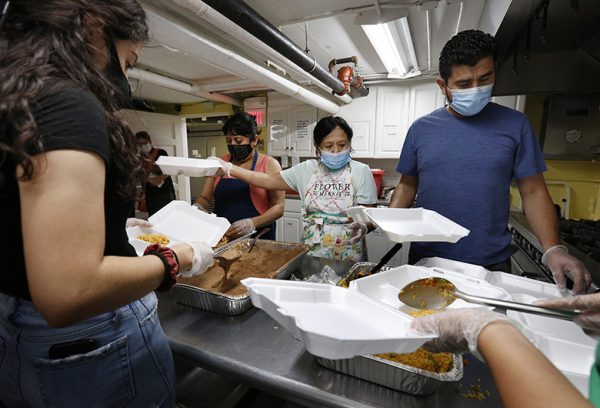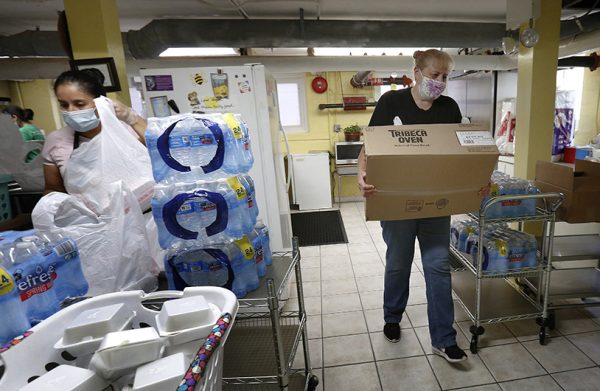The Most Blessed Trinity Parish Soup Kitchen, located on 8th Street in Waukegan, has greatly impacted the lives of others. Formed by newly retired coordinators Gerry and Ellen Tierney, the kitchen has been serving community members for over 20 years.
The soup kitchen prepares meals for the less fortunate and collects donations of clothing and toiletries to hand out to those in need every Wednesday, Thursday, Friday, and Saturday. Through the work of teamwork and faith, various churches volunteer here, often covering one Friday every month, including St. Mary’s Church in Lake Forest.
Lake Bluff residents, Tom and Kristin Marchisello, have accepted the position of coordinators to continue to keep this kitchen running smoothly. Alongside the leadership team of Regina Tseng, Sandeep Pilli, and the Marchisellos, the soup kitchen continues to make a lasting impact on the community of Waukegan.
To coordinator Tom Marchisello, serving in the kitchen is more than just giving out meals to those in need. It demonstrates his “mission to serve” people in our community, making a huge difference in the lives of others.
“The reality is Waukegan is ten minutes away and it’s our community, they are our neighbors,” Marchisello said. “For a lot of us, we are blessed to have means and can just go to Target to buy a new pair of gloves, but for them they don’t even have little things like that. We don’t have to think about whether we need to buy gloves or eat this week. The way I think about the soup kitchen is serving food and meals but I also think about bringing people love and a sense of dignity.”
The sense of “community,” according to Tom Marchisello, often attracts people to volunteer at the soup kitchen. Anything can make a difference and have a huge impact.

“Community, connectedness and compassion are what breeds people to think this is something that they should be doing. Whether it’s going to work at the soup kitchen or going to Target and picking up a pack of socks to drop as a donation,” Tom Marchisello said.
Through the idea of servant leadership, Tom Marchisello explains that Mother Theresa is a “phenomenal” example of it through her famous quote: “It’s fashionable to talk about the poor, it’s just not fashionable to talk to them.”
“I think that we spend time with people that are in need and when you talk to them you learn things about them. We don’t live the lives that they do, so we don’t realize the tradeoff they have to make,” he said.
What shows the success of the soup kitchen is the feedback they receive, including personal stories from people of their struggles and hardships in their lives.
“When you see them over and over again and you talk and engage with them you can see their mood shift, they feel comfortable, they feel loved, or they feel a sense of dignity. They feel like they can trust you. Things like that are pretty outstanding,” Tom Marchisello said.
Coordinator of the volunteers Kristin Marchisello said showing interest in the people who attend the kitchen is one of the most important parts of taking part in the volunteering.
“When you show compassion for people’s stories they take it in and hold onto it, and when they face the challenges they encounter between our Friday and the next Friday that we see them, maybe they’re able to turn away from them and not succumb to them. They remember when people talk to them and make them feel like people as opposed to a charity case. That makes a big difference to people,” Kristin Marchisello said.
Part of the St. Mary’s Parish community that volunteers often at the Most Blessed Trinity Parish soup kitchen is Deacon Bob Thomas. Attending the kitchen for over 15 years, he believes being involved is “rewarding on so many different levels.”
“What I like about volunteering there is there are so many levels. Naturally there’s a level of helping people – there’s so much need. Part of the diaconate calling as being a Deacon is to serve others, so fulfilling that service requirement is really rewarding,” Thomas said. “I love to see the smiles and faces of the recipients and to talk to them. Not about what’s going on in their lives, just how they are doing today and what’s going on. Conversely, to see the smiles on the faces of the volunteers and why they’re there, it’s very rewarding.”
Attending for many years, Thomas has developed a love for the kitchen on a personal level, obtaining multiple stories over the years. Before COVID-19, the dining area was located in the basement of the Most Blessed Trinity Parish. Thomas explains that being in the basement gave him more opportunity to “connect with people,” and explains a time when he truly connected and helped someone, reflecting the impact volunteers can have on someone’s life.
“A man came up to me and said ‘I really want to thank you for what you guys are doing. You’re feeding me, giving me clothes and helping me.’ I asked him how he got into this situation, and he said ‘well it’s a short story, I was in business, I’m college educated, but I was an alcoholic. My marriage went south, I lost my job, got fired, got divorced because of my alcoholism, and here I am, living on the street.’ He said ‘you guys are helping me wear the right clothes to get a job, but I have a problem. I have nowhere for them to call me back.’ So I worked with the pastor there and we set up phony phone lines so that it didn’t say you were calling Most Blessed Trinity Parish. Things like this are why I love serving at the soup kitchen: being able to help people,” Thomas said.
Another member of the St. Mary’s Church community who regularly attends the soup kitchen is Deacon Jack Herrman. Herrman explains there’s a “joy” of serving others, a reason why he loves being involved at the soup kitchen.

“There’s something that fills you with joy to work with food to impact other people. There’s a family atmosphere, and teamwork that is involved in it. It’s fun to work as a team, and you think ‘how are we going to pull together 150 meals for these people’ but with all the volunteers, it goes pretty fast,” Herrman said.
One of his favorite things about the kitchen includes the prayers that take place before handing out the meals.
“Ellen Tierney [retired coordinator] would always remind us of who we are there to serve, and to be grateful for the presence of the guests and to be good to them. To see them as God sees them. It’s a commoning moment for everybody because it’s usually frenetic getting all the food together in a hurry, and when we assemble and say a prayer together, it’s a good thing before we open the window to hand out the food. It’s a reminder of who we’re there for,” Herrman said.
For Kristin Marchisello, the impact the soup kitchen makes is shown not only by the smiles on people’s faces and the connections made but also through the clothes they wear.
“When it clicked for me on how much of an impact we made was seeing guests that come month after month, and clothes that my daughters no longer wear, they’re wearing them. These people are happy, and thankful. It’s as simple as things you’ve outgrown. We see that everyone is so appreciative, and really it’s not a lot for us to do. It gives so much to other people,” she said.
In hopes of attracting a younger generation to be more involved, Kristin Marchisello explains creating a commonality is one of the most important aspects along with getting people to “enjoy the work.” Very few of the volunteers at the soup kitchen are young, and many people hope to have more of the younger generation contribute to the impact it has on the community of Waukegan.
For Herrman, talking and engaging with the poor is very significant for younger generations to take part in.
“We talk about the poor, and this is a limited opportunity to actually say hello to them and let them know that they’re just as valuable and important as we are. A number of people take that opportunity, especially Deacon Bob and Tom Marchisello,” Herrman said. “They will go outside and talk to the folks in the line and see if they need anything, and just chat with them and talk about their day. It’s letting them know they have value and dignity, and it’s an opportunity to actually meet people face to face..”
Younger generations often involve themselves once or twice and believe that is enough to create a difference in the community. However, for Deacon Bob, he explains wanting to make an impact requires “stickiness”.
“I call it getting something to stick. I think it’s something you have to develop in your heart: you want to be close to God and have a friendship with Him and from that will flow the graces of serving others. You’ll get great joy in it because if you do it more than once or twice it will change you forever and you’ll get joy in serving,” Thomas said.
Wanting to help and dedicate time to make a lasting difference in the community and lives of others is greatly appreciated and needed at the Most Blessed Trinity Parish soup kitchen. Especially amongst high school students, it can provide joy and happiness in lives that cannot be found elsewhere.
“One person might think they won’t make a big impact and think ‘I’m not even going to move the needle’ and I think you can move the needle a tiny amount with one person. Anything can make an impact,” Tom Marchisello said.









Amani Yousuf • Mar 15, 2024 at 1:55 pm
Well done Amelia!!!